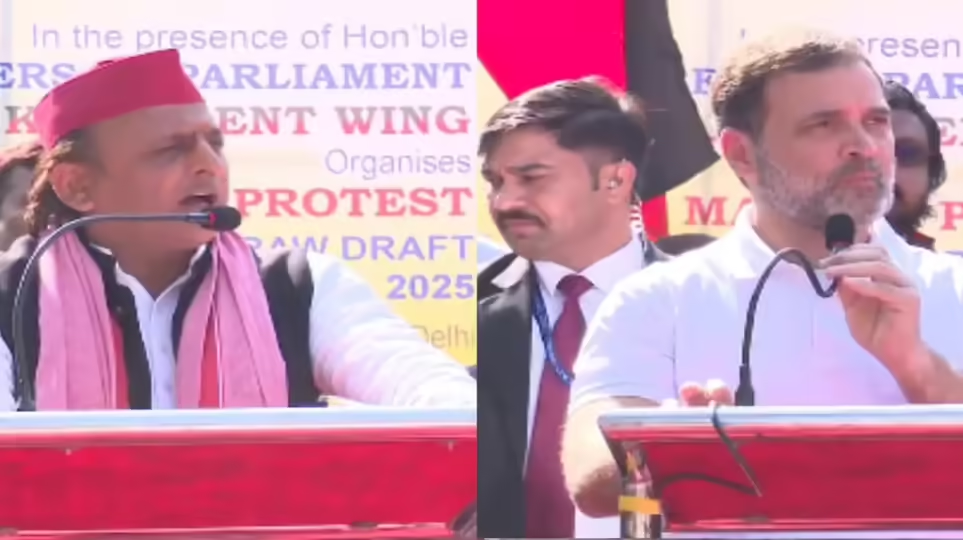Rahul Gandhi and Akhilesh Yadav Accuse Government of Favoring Industrialists Over Education: UGC Draft Rules Spark Outrage

The University Grants Commission (UGC), India's apex regulatory body for higher education, has recently introduced draft rules that have ignited a firestorm of criticism from political leaders, educators, and students alike. Among the most vocal critics are Congress leader Rahul Gandhi and Samajwadi Party chief Akhilesh Yadav, who have labeled the proposed changes as an "attack on education" and a "conspiracy to favor industrialists." The draft rules, which aim to revise the framework for higher education institutions, have raised concerns about the commercialization of education and the potential erosion of academic autonomy.
At the heart of the controversy is the UGC's proposal to allow higher education institutions to offer online degrees and courses without prior approval, as well as the introduction of a "self-disclosure" mechanism for universities to comply with regulatory norms. While the UGC claims these changes are intended to promote flexibility and innovation in education, critics argue that they could lead to a dilution of academic standards and an increased focus on profit-making. Rahul Gandhi, in a strongly worded statement, accused the government of prioritizing the interests of industrialists over the needs of students and educators. He warned that the draft rules could pave the way for private entities to exploit the education sector for financial gain, ultimately compromising the quality of education.
Akilesh Yadav echoed these sentiments, describing the UGC's draft rules as a "conspiracy to hand over education to industrialists." He emphasized that education is a fundamental right and should not be treated as a commodity. Yadav also expressed concern that the proposed changes would disproportionately affect students from marginalized communities, who may not have access to the resources needed to navigate an increasingly privatized education system. Both leaders called for widespread opposition to the draft rules, urging educators, students, and civil society organizations to unite against what they perceive as a threat to the integrity of India's education system.
The UGC's draft rules have also drawn criticism from academic experts, who argue that the proposed changes could undermine the role of public universities in providing affordable and accessible education. Public universities have long been seen as a cornerstone of India's education system, offering opportunities to students from diverse socio-economic backgrounds. However, the emphasis on online education and self-regulation could shift the focus toward private institutions, which often charge higher fees and cater to a more affluent demographic. Critics fear that this could exacerbate existing inequalities in access to education, further marginalizing underprivileged students.
Another contentious aspect of the draft rules is the proposed reduction in the UGC's oversight of higher education institutions. Under the new framework, universities would be required to submit self-disclosure reports detailing their compliance with regulatory norms, rather than undergoing regular inspections by the UGC. While this approach is intended to reduce bureaucratic hurdles, it has raised concerns about accountability and transparency. Critics argue that the self-disclosure mechanism could be easily manipulated, allowing institutions to bypass regulatory requirements without facing consequences. This, in turn, could lead to a decline in the quality of education and a loss of public trust in higher education institutions.
The UGC has defended its draft rules, stating that they are designed to modernize India's education system and align it with global standards. The commission has emphasized the importance of online education in expanding access to learning opportunities, particularly in the wake of the COVID-19 pandemic, which forced many institutions to adopt digital platforms. According to the UGC, the proposed changes will enable universities to offer more flexible and innovative programs, catering to the evolving needs of students and the job market. However, critics remain skeptical, arguing that the focus on online education could come at the expense of traditional classroom-based learning, which fosters critical thinking, collaboration, and interpersonal skills.
The debate over the UGC's draft rules has also reignited discussions about the role of education in society. Education has long been seen as a tool for social mobility and empowerment, enabling individuals to break free from the cycle of poverty and achieve their full potential. However, the increasing commercialization of education has raised concerns about its transformation into a profit-driven industry, where the primary goal is to generate revenue rather than nurture intellectual growth. Critics of the UGC's draft rules argue that they represent a step in this direction, prioritizing the interests of corporate entities over the needs of students and educators.
In response to the backlash, the UGC has invited feedback from stakeholders, including educators, students, and the general public, before finalizing the draft rules. This move has been welcomed by some as an opportunity for constructive dialogue, while others remain skeptical about the commission's willingness to address their concerns. The controversy has also highlighted the need for a broader conversation about the future of education in India, particularly in light of the rapid technological advancements and changing economic landscape.
As the debate continues, one thing is clear: the UGC's draft rules have struck a nerve, sparking a nationwide conversation about the values and principles that should guide India's education system. While some see the proposed changes as a necessary step toward modernization, others view them as a threat to the very foundation of education. The outcome of this debate will have far-reaching implications, not only for the millions of students who rely on India's education system but also for the country's future as a knowledge-driven economy. In the meantime, voices like those of Rahul Gandhi and Akhilesh Yadav serve as a reminder of the importance of safeguarding education as a public good, rather than allowing it to become a tool for private profit.
